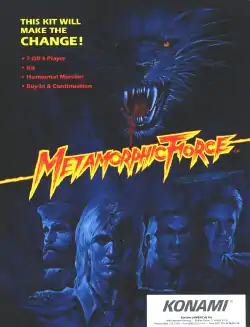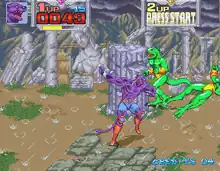| Metamorphic Force | |
|---|---|
 U.S. arcade flyer of Metamorphic Force. | |
| Developer(s) | Konami |
| Publisher(s) | Konami |
| Producer(s) | Kazu Kouzuki Y. Nishimura Masahiro Inoue |
| Programmer(s) | Gen Suzuki Tetsuya Wada Naotaka Yoshikawa |
| Artist(s) | Yuji Asano Satochan Soichiro Kitai Ricky |
| Composer(s) | Mutsuhiko Izumi Mariko Egawa |
| Platform(s) | Arcade |
| Release | August 1993 |
| Genre(s) | Beat 'em up |
| Mode(s) | Single player Multi player (2-4) |
| Arcade system | Mystic Warriors-based hardware |
Metamorphic Force (メタモルフィックフォース, Metamorufikku Fōsu) is an arcade game released by Konami in August 1993.[1] It is one of Konami's last side-scrolling Beat 'em up games to appear in the arcades along Violent Storm.
The game mechanics are similar to those of Konami's earlier arcade hit, X-Men, and runs on the same hardware as their ninja-themed game, Mystic Warriors.
Plot
The Evil King Death Shadow, ruler of the Empire of Horror, has arisen from the dead to rule the world once more. The Greek goddess Athena has summoned the souls of four ancient guardians and bestowed their power upon four heroes to stop the evil once again.[2] These guardians wield the ability to morph into anthropomorphic beasts to fight their enemies.
Protagonists
Ban (蛮), a martial artist. His guardian soul is a Fighting Bull, hence his beast form is a Minotaur.
Claude, a swordsman who wields a rapier. His guardian soul is a White Wolf, and he transforms into a White Werewolf.
Max, a fighter with a boxing style. His guardian soul is a Black Panther, and so his beast form is a Werepanther.
Ivan (Иван), a hunter and wrestler who fights with a small log. His guardian soul is a Bear, so he transforms into a Werebear.
Gameplay

The game's four main characters are able to morph into anthropomorphic "beasts" (referred to as Beast Mode) by collecting a Golden Statue power-up which drops from either a random chest that falls from the sky, or through an anthropomorphic rodent appearing at random times and supplying the player with either a Health Item, Score Item, or Gold Statue. The rodent will drop power-ups after a certain period of time, or if the player attacks him, similar to the elves in Golden Axe. When the players collect a Statue when already in Beast Mode, the character performs a "Screen Attack" destroying all on-screen enemies (if the Statue is collected during a boss fight, the boss is hit hard and usually twice).
The enemies are also anthropomorphic creatures such as frogmen, elephant men, lizardmen, hedgehog men, boar men, and others; and include bosses such as Cabrios the Ram-Man (similar to the pagan god Baphomet) armed with a Scythe, a Flaming Chicken-Man who wields a Sword, an Amazon Demoness, and the Dark Dragon.[3] At the end of Stages 2 and 4, players enter a bonus stage (destroy a statue or a string of regular enemies) which awards them extra points and health.
Differences between the US and Japanese versions
The US version of Metamorphic Force uses a numeric lifepoint counter that doubles as the timer, going down by one lifepoint each tick (much like in ‘’Gauntlet’’), while the Japanese version uses a traditional health bar. The Fifth Stage in the US version consists of a boss rush where the player fights the previous bosses in pairs before facing the level's own boss, while in the Japanese version the player fights that level boss only. In addition, some sprites have been completely altered, such as the stained glass artwork seen during the elevator scene in the Final Stage.
Reception
In Japan, Game Machine listed Metamorphic Force on their September 15, 1993 issue as being the seventeenth most-successful table arcade unit of the month.[4] In North America, RePlay reported that Metamorphic Force was the nineteenth most-popular arcade game in December 1993,[5] and Play Meter listed Metamorphic Force to be the 54th most-popular arcade game in January 1994.[6] In Europe, the game was selling well through January 1994.[7]
Legacy
- The complete soundtrack to Metamorphic Force is featured in the 2-disc CD album Konami Amusement Sounds '93: Autumn Edition, published on October 21, 1993 and distributed by King Records. Disc 2 contains all the tracks from the game.[8]
| Track # | Track name | Time |
|---|---|---|
| 01 | AD 199x | 00:56 |
| 02 | Heroes of Legend | 00:21 |
| 03 | A New Journey | 00:12 |
| 04 | The Ruins of Bakyaros | 04:29 |
| 05 | Cabrios Appears - Goat and Giant | 02:49 |
| 06 | Time of Victory | 00:08 |
| 07 | Tower | 04:07 |
| 08 | Cave of Fire | 02:25 |
| 09 | Fanfare | 00:08 |
| 10 | Destruction! | 02:00 |
| 11 | Celebration | 00:07 |
| 12 | Freezing Ground | 04:12 |
| 13 | Evil Ground | 03:39 |
| 14 | Human Soldier | 02:43 |
| 15 | Ganoo Appears - Forest of the Fierce Battle | 03:38 |
| 16 | Hurry! | 01:18 |
| 17 | Coliseum of Revenge | 05:31 |
| 18 | She-devil of the Coliseum | 02:59 |
| 19 | Warrior of Death Shadow Castle | 03:10 |
| 20 | Chorus | 03:24 |
| 21 | Death Shadow | 04:16 |
| 22 | Dragon of Fear | 03:06 |
| 23 | The End of Death Shadow | 01:16 |
| 24 | The Accidental Wound's Glory | 00:12 |
| 25 | Into the Hopeful Sky | 01:33 |
| 26 | Stand Tall! | 00:38 |
| 27 | Finale | 00:07 |
- Model DD6 and Model DD7 of Konami's Bemani games originate from this game. Model DD6 is used on Stages 2 and 7's boss battles while Model DD7 is used specifically on Stage 5's boss battle.
See also
References
- ↑ Metamorphic Force at The Killer List Of Videogames
- ↑ Arcade Flyer, front
- ↑ Arcade Flyer, back
- ↑ "Game Machine's Best Hit Games 25 - テーブル型TVゲーム機 (Table Videos)". Game Machine (in Japanese). No. 457. Amusement Press, Inc. 15 September 1993. p. 29.
- ↑ "The Player's Choice - Top Games Now in Operation, Based on Earnings-Opinion Poll of Operators: Best Video Software". RePlay. Vol. 19, no. 3. RePlay Publishing, Inc. December 1993. p. 12.
- ↑ "Equipment Poll - Video & Pinball Combined". Play Meter. Vol. 20, no. 1. Skybird Publishing. January 1994. p. 8.
- ↑ "International News: Japan". Play Meter. Vol. 20, no. 1. January 1994. p. 28.
- ↑ Metamorphic Force Soundtrack - Konami Amusement Sounds '93: Autumn